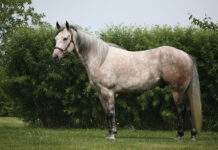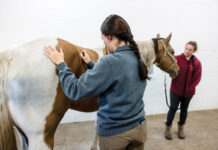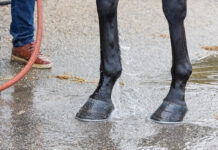
Q: I have a 15-year-old gelding that I acquired last year. When I first brought him home he was very underweight. I have been giving him grain and senior feed along with his hay to get his weight up but nothing seems to work. Someone told me that it may be stomach ulcers and try to cure them first and he will put weight on. Is that a possibility? Is there anything else that could be preventing him from gaining weight?
A: Whenever I am faced with a “hard keeper” such as yours, I automatically divide up the causes (and therefore solutions) into two categories: medical reasons and non-medical reasons. Working with your veterinarian to rule out medical reasons—such as stomach ulcers (technically referred to as gastric ulcers)—should always be the first step.
Your friend is right, gastric ulcers is absolutely on the list of medical reasons for weight loss or being underweight (along with parasites, dental disease, infections, and other causes). Here’s the list of clinical signs of gastric ulcers that I work from to help me determine if a horse may be dealing with this problem:
- Physical— loss of weight and condition, acute and recurring colic, reluctance to eat, poor hair coat
- Behavioral—attitude changes, irritability, resistance to work, dullness
- Performance—slower times, lead swapping, hitting jumps, reluctance to bend or collect, inadequate energy
Right now the only sure-fire way to diagnosis equine gastric ulcers is by gastroscopy, which means inserting an endoscope into the stomach and actually viewing the erosions. However, because this itself can be a stressful event and also because not every veterinarian has access to a long enough endoscope, sometimes diagnosis is made based on response to treatment. That is, a horse with appropriate history and clinical signs is prescribed omeprazole-containing GastroGard and response to therapy is used to confirm that the horse does indeed suffer from the condition.
Generally 48 hours is all that is necessary to determine if the patient is improving on the treatment regimen. If so, then your horse will need to stay on the medication until his ulcers are fully healed. You’ll also need to work with your vet to reduce risk factors for the condition as well as make certain diet and management changes. One of these changes may be adding a daily supplement during treatment to support stomach health that your horse will stay on afterwards. Then you may just need to provide him with ulcer prevention therapy—UlcerGard—during specific times of stress, such as changing barns, removing a herdmate, or trailering to a lesson.
If gastric ulcers turn out NOT to be the reason for your horse being underweight—and your vet is unable to uncover any other medical reason—then you’ll need to review the NON-medical reasons for weight loss, which I break down into these four categories:
- Food Quantity and Quality
Step back and really examine the forage and grain your horse eats. Is the hay from two years ago and does it look more like straw? Is the pasture mostly weeds or too small for the number of horses it supports? Is your grain from a small, local source that may not understand proper horse nutrition?Now think about how much your horse eats. Is he getting at least 2.0% of his body weight every day in food (for a 1000 pound horse that’s 20 pounds of hay and grain hopefully divided into two or more feedings). Is he getting at least as much grain as the label on the bag says? Are there long periods of time during the day when he has no food in front of him?
- Living Environment
Time to consider if there is any stress in your horse’s life you can eliminate. For example, does he have to compete for his share of hay and grain? Is he constantly having to dominate or submit to other horses in his herd life? Does he spend most of his time confined to a stall? Does he travel and compete frequently? Does he heave relief from sun, bugs, and heat in the summer and wind, snow, and cold temperatures in the winter? - Age & Breed/Genetics
Let’s face it, some breeds are harder to put weight on than others, such as Thoroughbreds. And certainly as horses age into their teens and twenties their bodies begin to function less efficiently. However, this doesn’t mean that certain breeds or older horses have to be thin. It just means that they may need more veterinary care and improved diet and management to keep up their weight. - Use/Workload/Travel Schedule/Stress
Next, bear in mind what calories you’re asking your horse to burn. Is he only used for occasional trail rides? Does he get ridden lightly four to five days a week? Or is he on a heavy training and competition schedule? Also remember that some horses do a better job of keeping up their weight (especially the topline) if given some controlled exercise beyond just turnout. Hacking on a long rein, lunging, or even handwalking up and down hills or over cavaletti may add muscle back to an inactive but thin horse.
Hopefully between this breakdown of medical reasons and non-medical reasons for why horses may be thin and your veterinarian’s help you’re on your way to a healthier, happier horse!
Throughout 2014, Dr. Lydia Gray will be answering your horse-health questions at horseillustrated.com/AskTheVet. Got a question for Dr. Gray? Send it to hc-editor@i5publishing.com and use subject line “Ask the Vet.”







